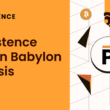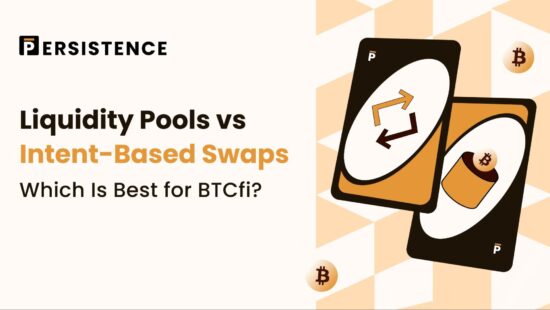Tl;dr
- Liquidity pools have always been at the heart of DeFi trading, but intent-based swaps might be the solution for the BTCfi world.
- Intent-based swaps dictate the outcome of a trade rather than how the trade is executed.
- They provide better UX, zero slippage, and aren’t prone to honeypots.
Since the start of Ethereum DeFi, Liquidity Pools and Automated Market Makers (AMMs) have been at the heart of decentralized trading in the crypto world. They provide the infrastructure for easy swaps between tokens at market-based rates – all without having to go through a centralized exchange.
However, a new technology called intent-based swaps is causing a stir as industry players start to suggest it could provide a better method of swapping assets—especially closely related assets like the many BTC variants spawned through BTCfi.
Let’s examine liquidity pools and intent-based swaps in depth to determine which is best for BTCfi.
Liquidity Pools vs Intent-Based Swaps: What Are They?
Liquidity pools have always been at the heart of DeFi, with protocols like Uniswap, PancakeSwap, and Aerodrome Finance leading the way. While these AMMs have been the heartbeat that’s fuelled DeFi growth over the years, there’s a new upcoming solution that has the potential to provide a better user experience with lower fees through intent-based swaps.
Before we examine why intent-based swaps are the next evolution in DeFi, let’s take a look at what liquidity pools and intent-based swaps are.
What are Liquidity Pools in AMMs?
Liquidity pools for AMMs form the basis of DeFi trading. Instead of trading between buyers and sellers, liquidity pools allow users to easily swap between assets in a permissionless way without having to go through a centralized exchange.
Liquidity pools solved the problem of low liquidity by allowing users to deposit their own assets to facilitate trades and earn fees. Typically, a liquidity pool will consist of two tokens, and the user depositing liquidity would usually have to deposit both tokens to add liquidity to the pool. Those depositing assets are referred to as Liquidity Providers (LPs).
When another user wants to trade, they utilize the AMM and execute the swap between the assets in the liquidity pool.
What are Intent-based Swaps?
Intent-based swaps provide a new route to swapping tokens on-chain by allowing users to specify the outcome of a particular swap rather than how the swap is executed. In a nutshell, they describe what needs to be swapped and leave the “how it’s done” up to an executioner called Solvers.
Intents can be single-chain intents on one ecosystem or cross-chain intents across multiple blockchains.
Instead of going through a single liquidity pool on one decentralized exchange, intents open the market up for market makers and Solvers to choose the best execution route. This allows them to utilize their resources across a unified liquidity source and earn fees for executing the intent.
Why Are Intent-Based Swaps The Next Evolution in DeFi?
While liquidity pools and AMMs have been instrumental in shaping DeFi, the potential of intent-based swaps to revolutionize the BTCfi industry is significant. These swaps are particularly beneficial in the BTCfi world, where the closely related BTC variants make AMMs and liquidity pools less effective for swapping.
Here are four reasons why Intent-based swaps are the next evolution in DeFi:
- Less complex with better UX
Intent-based swaps provide a better user experience for those looking to swap tokens. They allow users to connect their wallets and easily specify their desired outcomes without having to find the best source of liquidity for their swaps.
Intent-based swaps have the potential to simplify the complexities of cross-chain transactions, making the process seamless and making BTCfi and DeFi more accessible.
- No honeypots
Intent-based swaps also eliminate the potential for honeypot liquidity sources, providing a secure environment for users looking to swap. The permissionless nature of creating a liquidity pool on a DEX can open the industry to bad actors, but this scenario isn’t possible with intent-based swaps, as the Solver takes on the entire risk when executing the swap.
In fact, the Solver usually utilizes their funds to fill the intent and reclaims the funds (and the fees) from the smart contract after it has been executed.
- Faster swaps
Intent-based swaps also have the potential to provide faster swaps with instant finality. Once a solver picks up an intent, they can utilize their own funds to execute the swap and provide finality to the user by sending their desired tokens.
- Zero Slippage
Without intent-based swaps, users are constrained to a limited pool of liquidity, which can lead to slippage. However, as intent-based swaps can access a unified liquidity source, there is zero slippage for those placing the intent.
Persistence One: Building an Intent-based Swap Solution for BTCfi
Persistence One is on a mission to build the infrastructure to make cross-chain interoperability a reality for BTCfi. With dozens of BTC variants emerging from the numerous Layer 2 platforms, a solution is required to connect the BTCfi ecosystem to make it easy to swap between one BTC derivative and another.
As a result, Persistence One will become a major venue for moving all forms of Bitcoin around across multiple blockchains and ecosystems. The solution will provide an enhanced user experience and elevate the interoperability for the BTCfi world.
About Persistence One
Persistence One is building a Bitcoin interoperability solution to enable cross-chain BTC swaps across Bitcoin Layer 2s.
The rapid rollout of Bitcoin L2s and side chains has led to fragmentation, hurting BTCfi scalability. Using the power of intents, Persistence One will enable users to move assets across Bitcoin Layer 2s more efficiently than traditional bridging, offering fast, secure, zero-slippage cross-chain swaps.
Twitter | LinkedIn | Telegram | YouTube | Reddit | [email protected]





